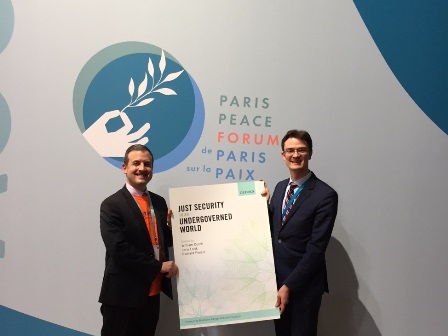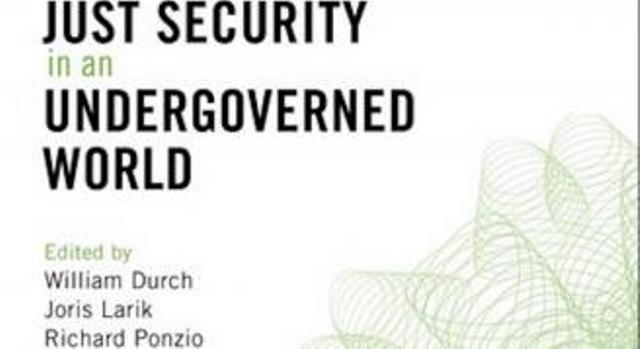Platform on Global Security, Justice & Governance Reform suggested finding solutions to armed conflict, climate change, cyber threats, and cross-border economic shocks requires bold and innovative approaches to global leadership.

Dr. Richard Ponzio is Director of the Just Security 2020 Program at the Stimson Center, has been working to advance the recommendations of the Albright-Gambari Commission on Global Security, Justice & Governance. Previously, he directed the Global Governance Program at The Hague Institute for Global Justice, where (in partnership with Stimson) he served as Project Director for the Commission on Global Security, Justice & Governance. He is formerly a Senior Adviser in the U.S. State Department’s Office of the Special Representative for Afghanistan and Pakistan, where he conceptualized and coordinated Secretary Hillary Clinton’s and later John Kerry’s New Silk Road initiative. He has served with the United Nations in Afghanistan, Bosnia, Kosovo, New York, Pakistan, Sierra Leone, and the Solomon Islands. Dr. Ponzio has published widely, including Democratic Peacebuilding: Aiding Afghanistan and other Fragile States (OUP, 2011) and Human Development and Global Institutions: Evolution, Impact, Reform with Dr. Arunabha Ghosh (Routledge, 2016). He has undertaken studies in political economy and international relations at the University of Oxford (DPhil/PhD), The Fletcher School of Law & Diplomacy (MA), The Graduate Institute of International and Development Studies-Geneva (MA), and Columbia University (BA).
Ponzio says: Between now and 2020 (the UN’s 75th anniversary), I am working with partner organizations to advance the recommendations of the Albright-Gambari Commission on Global Security, Justice & Governance, including in the areas of “coping with violent conflict & state fragility”, “climate & people”, “governing the hyperconnected global economy”, and “UN and broader global governance reforms.” For further details, please visit: http://www.globalsecurityjusticegovernance.org/

Three major changes are recommended by the group, echoing some of the proposals already made by Kofi Annan and the group of Elders.
- Make key changes in UN Security Council membership to make the Council more effective and representative. For example, a small amendment to the UN Charter’s Article 23 could allow nonpermanent members to be re-elected for consecutive terms. And the Council’s permanent-five members (Britain, China, France, Russia and the US) should refrain from using their veto in cases of mass atrocities against civilians.
- Create a “G20+” as part of a new framework for global economic cooperation. This new G20+ configuration could also strive to prevent the spread of cross-border financial shocks, promote the reduction of economic inequality and foster the inclusive growth that is necessary for achieving the Sustainable Development Goals by 2030.
- Establish a UN parliamentary network as an advisory body under UN Charter Article 22. The network would engage parliamentarians from their own legislatures to advise the General Assembly on UN governance.
For details of their recommendations, see PassBlue 17 October 2018 edition or access https://www.passblue.com/2018/10/17/reviving-multilateralism-on-the-road-to-2020/
- Leaders have gathered for their annual confab in New York, the main home of the United Nations. But this is no ordinary year—as 2020 is, as this audience knows, when Our World Organization commemorates the 75th anniversary of its birth. This is also no ordinary time, as like the Second Iraq War crisis of 2003, which ushered in important changes at the United Nations such as a new Peacebuilding Architecture, upgrade of the Human Rights Council into an empowered Council, and adoption of the Responsibility to Protect norm, we face at least two monumental crises today that create a moral imperative and practical necessity to pursue structural, transformative changes in our system of global governance, far beyond the necessary yet insufficient current wave of basic management reforms undertaken by Secretary-General Antonio Guterres.
- The First Crises is, of course, the quintessential global governance challenge of our time: climate change, and as the latest ominous IPCC projections tell us, the need to urgently invest as much now in comprehensive adaptation strategies as mitigation strategies that seek to slow and reverse runaway global climate change.
- The Second Crises, at least in the short-term, strikes at the very heart of the rules-based international order and new global institutions, such as the United Nations, established in the aftermath of Second World War: the relatively sudden and somewhat ferocious rise of populist and anti-multi-lateralist forces from Europe to the United States, or as witnessed in recent weeks, from Brazil to Australia.
- It has become a truly dangerous global phenomena that, along with climate governance, the hyperconnected global economy, and continued difficulties in coping with violent conflict and fragile states, my colleagues and I at the Stimson Center – and partners from around the world – have sought to better understand and put forward creative and carefully researched and consulted proposals to better respond to these new global problem-sets through nothing short of a dramatically renovated—and in some ways reimagined or some would say “third generation”—system of global governance.
- In our brief overview presentation, my colleague Dr. Joris Larik and I will underscore why we initiated, in 2014 and 15, the Albright-Gambari Commission on Global Security, Justice & Governance Reform and follow-on Platform on Global Security, Justice & Governance Reform launched yesterday, on Armistice Day, here at the inaugural Paris Peace Forum. We’ll briefly share a few of the activities we intend to undertake through the Platform, designed to operationalize the concept “just security” as a new over-arching and integrative vision for our multilateral system of governance that seeks to strike a better balance between principles of justice and a people-centered world order with the continued, pre-dominant concern for state security in global affairs. We’ll then turn to a few of the far-reaching global governance innovation proposals that believe merit serious discussion, if not adoption, in the run-up to 2020, and then we’ll conclude with some thoughts on what we view as a pragmatic but ambitious strategy for how we “Get from Here to There” these next two year and beyond.
- So why did we initiate the Albright-Gambari Commission in 2014 and then present, in 2015, its comprehensive set of 85 global governance reform recommendations first at the Peace Palace in The Hague and then UN Headquarters and elsewhere? The abbreviated version is that we felt that the UN and other global institutions are woefully inadequate for coping with let alone help national and sub-national actors to better come to grips with and resolve the major global challenges I outlined earlier. Through the course of our research and more than 30 consultations worldwide, we also developed a strong conviction that effective problem-solving requires both global collaboration and attention to serious deficits of justice as well as security, to create what we call “just security.”
- Since April 2016, the goals of our Just Security 2020 program have been to:
- First, to convene Track 1.5 global policy dialogues to promote consensus around select Albright-Gambari Commission and other priority global governance reform innovations in the areas of conflict management, climate governance, and the hyperconnected global economy, and to take these ideas forward through new informal communities of practice coming out of each dialogue;
- Second, to conduct research, policy analysis, and outreach;
- And finally, to develop a Platform on Global Security, Justice & Governance Reform as a new, interactive knowledge platform to promote results of the project’s research, coalition-building, and advocacy agenda.
- Joris’ 8 mins. (4 mins for 15:20 Meet up Session)
- Word Count so far (for part II): 619, 4 mins should only go to 560
- So returning to where we started, it’s September 2020, world leaders are about to assemble in New York. We basically have two choices: and given the scale of climate challenge alone, let alone rise of populist and anti-multilateralist forces, the worst-case-scenario is if we chose at this crucial time a least-common-denominator approach that undertook a simple “stocktaking review” of progress of the UN’s major pillars and a basic recommitment to multilateral principles. This, in our view, would be the equivalent of “standing still” and would play into the hands of nationalist forces that seek to erode and over time retire many of our core institutions of global governance.
- Rather, and this is naturally the better or even “best case scenario”, we can opt to come together as a Global Community and build the case for the Kind of Global System of Governance we urgently need and aspire to achieve. Fortunately, there are many recent positive lessons to mine from civil society and like-minded countries coming together to bring about progressive global change in relatively short time-spans, from the CICC and Landmine campaigns in the 1990s to the more recent 1 for 7 Billion and R2P coalitions. Moreover, there are several new global civil society campaigns and umbrella coalition building efforts that our new Platform on Global Security, Justice & Governance Reform is partnering with and feeding ideas to, including the UN2020 Initiative, the Campaign for a UN Parliamentary Assembly, the Global Town Halls Project, and unveiled for the first time here at the inaugural Paris Peace Forum, Together First, which is galvanizing a younger generation of practitioners, scholars, and activists to ensure that the UN’s 75th anniversary celebration amounts to far more than a simple celebratory birthday party. 2020 will need to represent a “landing pad” of sorts, where some critical near-term proposals are debated, adopted, and helped to set our global system on a proper trajectory once more, for those more ambitious proposals that are not adopted, 2020 can also represent a “launch pad” and positive Road Map toward more transformative goals when the political conditions ripen.
- Finish with: The UN can no longer afford to be viewed or act as an organization that is solely beholden to its 193 Member State shareholders, which would make it a relic of 20th intergovernmental global governance. Rather, the future of global governance is fast becoming one where the most innovative and agile actors are encouraged to rise into leadership roles; in short, where the best ideas, capabilities, and global networks from both non-state and state-based institutions can be tapped and channeled Together – Together First rather than Any One Country First, however big or powerful – toward addressing common global challenges, threats, and opportunities. In our increasingly hyperconnected world, we have no choice but to transform the United Nations into a highly flexible and creative system of multi-stakeholder global governance.
- Just as Armistice Day 100 years and 1 day go ushered in the world’s first-generation experiment in global governance in the form of the League Nations, birthed at the Paris Peace Conference, it’s time that we as a global community embark on the journey to a Next Generation, New United Nations. It won’t happen in the next two years, but with a New Kind of Global Leadership and a groundswell of public pressure and a New Global Ethic from within Civil Society, it could happen by the UN’s 80th, 90th, or certainly, if it’s Not too Late, 100th anniversary of the United Nations in 2045. For the Sake of All of Us, and Future Generations, let’s hope we’re Not too Late … Let’s begin this new journey, Together, and make the very best of these Next Years on the Road to 2020.




